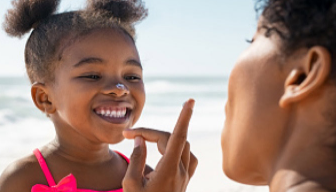July 24, 2023
For young children, social and emotional health is a protective factor. They can use their social and emotional skills to bounce back from daily hassles and frustrations. Socially and emotionally healthy children can make friends, ask for help, express their feelings, and enjoy life. They know how to wait for a turn. They can try again when their block buildings fall down. They are willing to try new foods or learn a new game.
The Devereux Center for Resilient Children recognizes three within (internal) protective factors in young children that contribute to their resilience and social and emotional health: Initiative, Self-Regulation, and Attachment/Relationships. The adults in children’s lives, especially their parents/families, are so important in helping them develop each of these protective factors. It’s even more important for parents/families to understand the impact of doing so. What a child does now can give you a glimpse of what they will do later in life. Here are some examples:
Preschool
Initiative
- If now … She tries different ways to solve a problem – on her own and with other children … then later … She’ll look for new ways to solve problems and complete daily tasks.
- If now … He chooses to do something challenging … then later … He’ll explore new interests, hobbies, and skills.
Self-Regulation
- If now … He tells others how he feels, rather than acting out in anger … then later … He’ll respect and talk about his concerns with others.
- If now … She finds something else to do when you are busy … then later … She’ll find another option when her first choice isn’t available.
Attachment/Relationships
- If now … Your child lets you know she needs help when something is difficult … then later … She’ll know it is okay to ask for help, and she’ll offer to help others as well.
- If now … Your child usually says good-bye without getting upset when you drop him off at preschool … then later … He’ll enjoy and value the time he spends alone or with friends.
Infant/Toddler
Attachment/Relationships
- If now … Your infant calms down when you hold her close and talk gently … then later … She will be able to calm herself in safe and healthy ways when faced with stressful situations.
- If now … Your toddler happily waves goodbye to you when you drop her off … then later … She will develop a sense of trust that you will return because you said so.
Self-Regulation
- If now … Your infant works hard to scoot and grasp a toy … then later … He will be able to work hard to accomplish goals that he sets for himself.
- If now … After a disagreement with another child over a toy, your toddler agrees that it is okay to take turns with it … then later … He will solve problems, negotiate, and share. He will likely be a good friend to others.
Initiative
- If now … Your infant learns to hold her cup and spoon all by herself … then later … She will be more persistent and motivated to try new things in the future.
- If now … Your toddler picks out one of the two books you offer to read before bedtime … then later … She will develop a feeling of responsibility and control over what she does.
For more information, including strategies that parents/families can try at home with their young children to promote these protective factors, check out:



